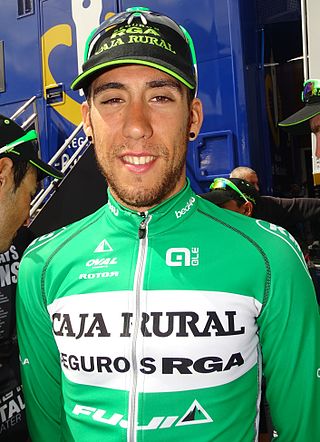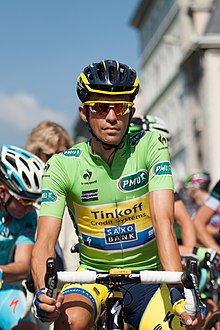The Vuelta a España is an annual multi-stage bicycle race primarily held in Spain, while also occasionally making passes through nearby countries. Inspired by the success of the Tour de France and the Giro d'Italia, the race was first organised in 1935. The race was prevented from being run by the Spanish Civil War and World War II in the early years of its existence; however, the race has been held annually since 1955. As the Vuelta gained prestige and popularity the race was lengthened and its reach began to extend all around the globe. Since 1979, the event has been staged and managed by Unipublic, until in 2014, when the Amaury Sport Organisation acquired control. Since then, they have been working together. The peloton expanded from a primarily Spanish participation to include riders from all over the world. The Vuelta is a UCI World Tour event, which means that the teams that compete in the race are mostly UCI WorldTeams, with the exception of the wild card teams that the organizers can invite.

Alessandro Petacchi is an Italian former professional road racing cyclist, who rode professionally between 1996 and 2015. A specialist sprinter, Petacchi has won 48 grand tour stages with wins of the points jersey in the Giro d'Italia in 2004, the Vuelta a España in 2005 and the Tour de France in 2010. He also won the classics Milan – San Remo in 2005 and Paris–Tours in 2007. His career spanned over 18 years during which he earned 183 victories.

The King of the Mountains (KoM) is an award given to the best climbing specialist in a men's cycling road race; in women's cycle racing, Queen of the Mountains (QoM) is used.

The points classification in the Giro d'Italia is one of the secondary classifications in the Giro d'Italia. It is determined by points awarded for placings in the daily stages, regardless of time gaps. From 1967 to 1969 the leader wore a red jersey but in 1970 it was changed to mauve, and named the maglia ciclamino, the name of the colour in Italian being derived from the alpine flower the cyclamen. The red jersey was re-introduced in 2010, as the maglia rosso passione. However, in April 2017 RCS Sport, the organisers of the Giro, announced that the maglia ciclamino would be revived for the 2017 Giro d'Italia.
Numerous cycling stage races award a white jersey to signify the current leader and overall winner of a certain competition, or to signify the best young rider in the race. The most prominent of these is the Tour de France, where the jersey is known as the maillot blanc and is awarded to the best-placed rider age under 26. The use of the white jersey to recognize the best young rider in a race is its most common use, though some tours award a white jersey for a different classification.
The points classification is a secondary award category in road bicycle racing. Points are given for high finishes and, in some cases, for winning sprints at certain places along the route, most often called intermediate sprints. The points classification is the top prize for many cycling sprinters and is often known as the sprint classification; however, in some stage races these classifications are based on different criteria.
Young rider classification is a cycling jersey competition in multi-day stage race events, such as the Tour de France, Giro d'Italia and many others, which awards the current leader by overall time for riders below the age of twenty-six years depending on the race rules. At the Tour Down Under recipients are aged under twenty-six. Recipients are commonly known as the Best young rider.

The 2008 Vuelta a España was the 63rd edition of the Vuelta a España, one of cycling's Grand Tours. The race began with a 7 km (4.3 mi) team time trial on 30 August in Granada. The Vuelta came to a close twenty-three days later with a 102.2 km (63.5 mi) flat stage, which brought the peloton into the streets of Madrid. Nineteen teams entered the race, which was won by the Spaniard Alberto Contador of Astana. Second and third respectively were the American Levi Leipheimer of Astana and the Spanish Carlos Sastre of CSC–Saxo Bank.
The 28th Edition Vuelta a España, a long-distance bicycle stage race and one of the 3 grand tours, was held from April 26 to May 13, 1973. It consisted of 17 stages covering a total of 3,061 km, and was won by Eddy Merckx of the Molteni cycling team. As Merckx had already won several editions of the Tour de France and the Giro d'Italia with his win in the Vuelta, he became the third cyclist after Jacques Anquetil and Felice Gimondi to win all three grand tours in his career. Merckx went on to win the 1973 Giro d'Italia and became the first cyclist to win the Vuelta-Giro double. Merckx also won the points classification and José Luis Abilleira won the mountains classification. With Merckx finishing first, Ocaña second and Thévenet third the podium of the 1973 Vuelta contained one previous winner and two future winners of the Tour de France making it one of the best podiums in the history of the race, according to the official race website. Merckx won six stages in this edition and Gerben Karstens won four.
Since the first Giro d'Italia in 1909, there have been 2,074 stages. This number includes half-stages, prologues, and a small number of stages cancelled mid-race or immediately before the start. This number is up to date after the 2023 Giro. Since 1931, the race leader following each stage has been awarded the pink jersey.

The 2009 Vuelta a España was the 64th Vuelta a España. The event took place from 29 August to 20 September 2009. For only the second time in the race's history, it began away from Spanish soil, with the race not in fact reaching Spain until Stage 5.

The points classification is a secondary competition in the Tour de France, which started in 1953. Points are given for high finishes in a stage and for winning intermediate sprints, and these are recorded in a points classification. It is considered a sprinters' competition. The leader is indicated by a green jersey, which has become a metonym for the points classification competition.

The 2012 Giro d'Italia was the 95th edition of Giro d'Italia, one of cycling's Grand Tours. It started in the Danish city of Herning, and ended in Milan. The complete route of the 2012 Giro d'Italia was announced in mid October. For the first time since the 2007 edition no climbing time trial was included in the route. The colour of the jersey for the mountains classification was changed for this year's edition from green to blue. The move came at the behest of sponsor Banca Mediolanum, who renewed its support of the mountains classification for a further four years.

The 2012 Vuelta a España started on 18 August 2012 and was the 67th edition of the race. The race began in Pamplona with a team time trial and ended on 9 September, as traditional, in Madrid. The 2012 edition saw the return of the Bola del Mundo mountain top finish. It was the venue of an exciting battle between winner Vincenzo Nibali and runner-up Ezequiel Mosquera in the 2010 edition. It was the first time since 1994 that the race visited the region of Navarre. The previous time that Pamplona was visited by a Grand Tour in 1996, when the city hosted the finish of a memorable stage of the 1996 Tour de France. On that occasion, the race paid homage to Miguel Indurain by passing through his home village of Villava en route.

The 2014 Vuelta a España took place between 23 August and 14 September 2014 and was the 69th edition of the race. It featured eight mountain stages, five hill stages, five flat stages, and three time trials, two of which appeared at the beginning and end of the race. Jerez de la Frontera, on the Spanish south coast, hosted the opening stage. The Vuelta then went counterclockwise, through the south-east and east of the country before crossing the north and finishing in Santiago de Compostela. This was the first time in 21 years that the race has finished outside Madrid.

Omar Fraile Matarranza is a Spanish racing cyclist, who currently rides for UCI WorldTeam Ineos Grenadiers. He is a winner of stages in the Tour de France and the Giro d'Italia, and has twice won the Mountains classification in the Vuelta a España.

The 2019 Vuelta a España was a three-week Grand Tour cycling stage race that took place in Spain, Andorra and France between 24 August and 15 September 2019. The race was the 74th edition of the Vuelta a España and is the final Grand Tour of the 2019 cycling season. The race started with a team time trial in Torrevieja on the Costa Blanca.

The 2020 Vuelta a España was the 75th edition of the Vuelta a España, one of cycling's three grand tours. It was won for the second consecutive year by Primož Roglič of Team Jumbo–Visma.












